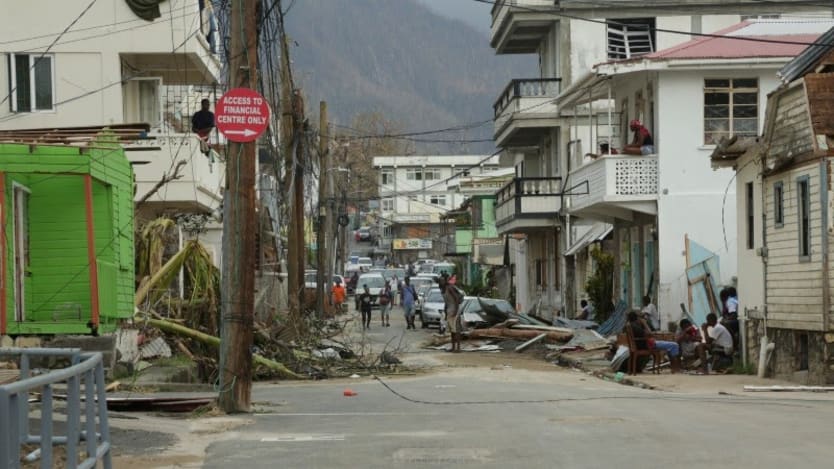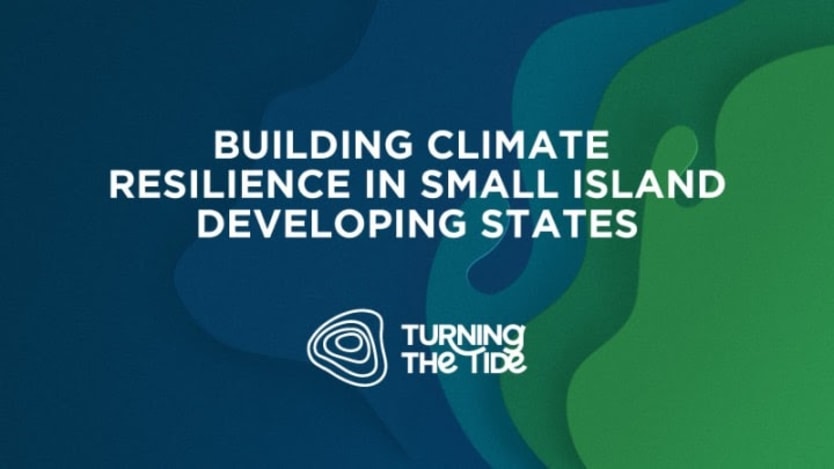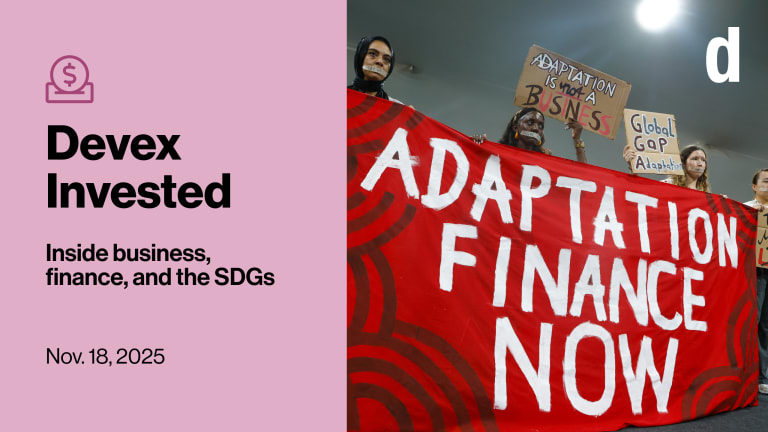
After Hurricane Maria swept through Dominica in 2017, causing extensive damage to crops, livestock, and 90% of homes, and generating losses of 226% of its gross domestic product — this island of some 70,000 people set out a bold vision to become the world’s first climate-resilient nation. Soon after, it established the Climate Resilience Execution Agency for Dominica to drive this vision forward, and a Climate Resilience and Recovery Plan, setting out how it will build stronger finances, infrastructure, and communities by 2030.
At $3 billion over 10 years, the plan should not be difficult to fund. But the government’s budget for fiscal year 2019-20 was $377 million, of which 60% went on recurrent costs — including large debt repayments — leaving just $150 million for resilience measures. Meanwhile, donor funding also falls short of the volumes needed — Dominica has received some $60 million in development aid from 2009-2018, with further commitments since Hurricane Maria that we estimate to be at least $100 million.
Borrowing more is not an option
Small island developing states, SIDS, are heavily dependent on external markets both for goods, due to their tiny economies of scale, and services — owing to limited human resources. Because of their location and complex topographies, the cost of building infrastructure in SIDS is typically high, and the cost of insuring it onerous due to the frequency of natural hazards.
Borrowing their way to resilience is simply not an option. With debt-to-GDP ratios at over 100% in some islands, most Caribbean governments are at the upper limits of what is considered sustainable. They can probably cover around 50% of the costs themselves, but to close the financing gap they will need grants and private capital. However, under the current rules, only 67% of SIDS are eligible for ODA.
Climate finance has failed to live up to its promises
Podcast: Cultural identity, small island states, and climate change
In the fifth episode of Turning the Tide: Climate Champions, Palauan diplomat Ngedikes Olai Uludong shares her experience representing small island developing states in the global arena and explains why preserving islands' cultural traditions and identities is so important in the fight against climate change.
According to the Organisation for Economic Co-operation and Development, $71 billion a year in climate finance is currently available, and funding is heavily skewed towards reducing emissions. This isn’t much help to low- and middle-income countries that need up to $300 billion per year for adaptation alone.
The largest single-country adaptation project on the Green Climate Fund’s books is $405.1 million for urban water supply and wastewater management in Fiji, but only $31 million in grant funding. The Adaptation Fund has dispersed $306 million in total to adaptation activities, but this is across 60 plus countries.
A ‘Catch-22’ for small states?
Development partners have experienced obstacles in funding resilience plans more generously, including issues such as:
• Public financial management — they question whether small islands can effectively absorb hundreds of millions of dollars a year.
• Short-term political agendas that are not always aligned with the resilience rhetoric.
• Public agencies that are not given the authority to implement resilience plans.
• Lack of technical capacity within ministries and public bodies to prepare investment plans up to required standards for international funding.
4 changes in mindsets could help to tangibly advance the SIDS resilience agenda:
1. SIDS governments need to think strategically in defining their resilience agendas
This means establishing a baseline, metrics, and targets for each sector; defining a roadmap; and prioritizing investments. Critically, the investment plans must be able to stand the test of political cycles, resilience is a marathon not a sprint. Governments will need to show a genuine desire to undertake necessary reforms — enhancing public sector fiscal management systems, adjusting national budget allocation processes to prioritize resilience investments, using public funds to crowd in private finance, and strengthening the role of dedicated delivery entities to execute capital projects. This would give them a better chance of negotiating additional financing from donors and development financiers.
2. Development finance institutions need to look for ways to maximize financing for SIDS’ resilience plans
Per capita income is a mediocre metric for a country’s ability to cover the costs of an ambitious resilience agenda. The country resource allocations of multilateral agencies should reflect exposure to hazards and the per capita costs of achieving resilience — independent of country size or per capita GDP.
If governments can provide a robust and compelling investment plan, potentially developed with support from development financial insitutions, and demonstrate adequate delivery capacity, then borrowing rules could also be flexible in the near term — given that up-front investments will be relatively large — compared to the size of these economies — and returns will only materialize later on. These investment plans will need to define how to attract private capital, for example through blended finance instruments, structure public-private partnerships and at the very least, be wary of crowding out this investment by overextending public involvement.
3. Donors need to allocate much more funding for resilience
There is simply no way around this. Once a country has been hit by disaster, funds often flow — or at least are committed — quickly; but investing in resilience upfront saves money over the long-term. This ought to be factored into donor allocations at national and regional levels. Similarly, the rules guiding the allocation of international climate finance would benefit from being revised so that they serve the interests and agendas of vulnerable countries.
4. Coordination is key to maximizing investment in resilience and helping SIDS to achieve their goals
There are some encouraging signs of better coordination between development partners — such as the creation of joint World Bank/International Monetary Fund climate change policy assessments and disaster reduction strategies. This needs to become the norm, or critical synergies between projects will be missed and redundancies created.
A commitment to resilience means taking risks. For the global development community, this means focussing on the end goal and allowing for greater flexibility in access to concessional finance and grants as well as actively catalyzing private investment, while governments need to commit to a long-term vision and look beyond the time horizon of the next election cycle. This will serve them well not only in the climate crisis, but also for potential future shocks like pandemics.
Update, Oct. 26, 2020: This op-ed was updated to state that aid to Dominica was allocated from 2009-2018, with further commitments since Hurricane Maria estimated by the authors to be at least $100 million.
The authors would like to thank Floris Vermeulen from the European Investment Bank for his thoughtful suggestions on improving this article.
Visit the Turning the Tide series for more coverage on climate change, resilience building, and innovative solutions in small island developing states. You can join the conversation using the hashtag #TurningtheTide.










